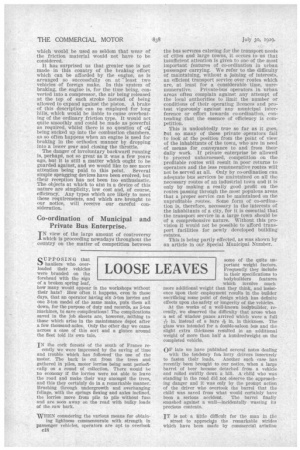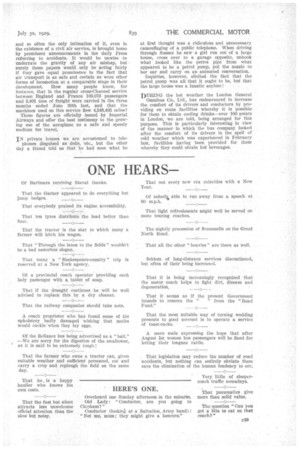LOOSE LEAVES
Page 40

Page 41

If you've noticed an error in this article please click here to report it so we can fix it.
SUPP OSING that hauliers who overloaded their vehicles were branded on the forehead with the sign of a broken spring leaf, how many would appear in the workshops without their hats? How often it happens, even in these days, that an operator having six 5-ton lorries and one 3-ton model of the same make, puts them all down, for the purpose of duty and records, as 5-ton machines, to save complications! The complications saved in the job sheets are, however, nothing to those which arise in the maintenance depot after a few thousand miles. Only the other day we came across a case of this sort and a glance around the fleet told its own tale, IN the cork forests of the south of France re cently we were impressed by the saving of time and trouble which has followed the use of the motor. The bark is cut from the trees and gathered in piles, motor lorries being sent periodically on a round of collection. There would be no economy if the lorries were not able to leave the road and make their way amongst the trees, and this they certainly do in a remarkable manner. Brushing through undergrowth and overhanging foliage, with the springs flexing and axles inclined, the lorries move from pile to pile without fuss and are soon away on the road with bulky loads of the raw bark.
WHEN considering the various means for obtaining lightness commensurate with strength in passenger vehicles, operators are apt to overlook c1.8 some of the quite important weight factors. Frequently they include in their specifications to bodybuilders features which involve much more additional weight than they think, and iusistence upon their employment results in the builder sacrificing some point of design which has definite effects upon the safety or longevity of the vehicles. At the works of a well-known bodybuilder, recently, we observed the difficulty that arose when a set of window panes arrived which were a full in. instead of a bare in. in thickness. The glass was intended for a double-saloon bus and the slight extra thickness resulted in an additional weight of more than half a hundredweight on the completed vehicle.
OF late we have published several notes dealing with the tendency for• lorry drivers insecurely to fasten their loads. Another such case has recently been brought to our notice, when a large barrel of beer became detached from a vehicle and rolled swiftly down a hill. A child who was standing in the road did not observe the approaching danger and it was only by the proMpt action of the driver who overtook the barrel that the childwas saved from what would certainly have
been a serious accident. The barrel finally smashed against a wall—incidentally wasting its precious contents:
IT is not a little difficult for the man in the street to appreciate the remarkable strides which have been made by commercial aviation and so often the only intimation of it, even in the existence of a civil air service, is brought home by prominent announcements in the daily Press referring to accidents. It would be unwise to underrate the gravity of any air mishap, but surely these papers would, only be acting fairly if they gave equal prominence to the fact that air transport is as safe and certain as were other forms of locomotion at a comparable stage in their development. Row many people know, for instance, that in the regular cross-Channel service between England and France 109,076 passengers and 3,401 tons of freight were carried in the three months ended June 30th last, and that the machines used on this service flew 4,348,405 miles?
These figures are officially issued by Imperial 'Airways and offer the best testimony to the growing use of the aeroplane as a safe and speedy medium for travel.
IN private houses we are accustomed to telephones disguised as dolls, 'etc., but the other day a friend told us that he had seen what he at first thought was a ridiculous and unnecessary camouflaging of a public telephone. When driving through Sussex he saw a girl run out of a large house, cross over to a garage opposite, unhook what looked like the petrol pipe from what appeared to be a petrol pump, put the nozzle to her ear and carry on an animated conversation.
Inquiries, however, elicited the fact that the petrol pump was all that it ought to be, but that the large house was a lunatic asylum !
DURING the hot weather the London General Omnibus Co., Ltd., has endeavoured to increase the comfort of its drivers and conductors by providing en route facilities whereby it is possible for them to obtain cooling drinks—over 100 points in London, we are told, being arranged for this purpose. This is particularly interesting in view of the manner in which the bus company looked after the comfort of its drivers in the spell of cold weather which was experienced in February last, facilities having been provided for them whereby they could obtain hot beverages.












































































































